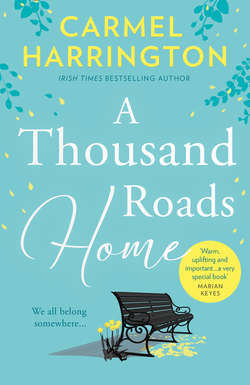Читать книгу A Thousand Roads Home: ‘A weepy but important book’ Cecelia Ahern - Carmel Harrington - Страница 13
6 RUTH
ОглавлениеThen
Ruth slipped a navy sleep mask over her eyes, smiling in satisfaction when her brother, Mark’s, small kitchen disappeared into darkness. Armed with her bowl of chopped fruit, she moved eight steps to the small dining-room table, which sat at the edge of the open-plan kitchen and living room. She had considered eating standing up, against the sink. But the thought was fleeting. One, her lower back ached and she needed the welcome relief of sitting. Two, more importantly, the sink was not the correct place to eat.
Ruth liked to do the correct thing. Follow the rules.
‘Sorry, little baby. Be patient,’ she whispered.
A third kick under her ribcage made her jump and elicited a loud bellowing laugh. ‘Not afraid to look for what you want, that’s my fierce little one.’ In delight, she rubbed her round tummy.
The baby responded by kicking her once again, its target the top of her pelvis. She lowered the bowl onto the table, ignoring the stabbing pain, then sat down. The relief was immediate. She felt her body celebrating the respite from hauling around the additional weight she now carried on her slight frame.
Reward for her efforts was immediate when Ruth popped a large slice of mango into her mouth. The sweet, tangy juice spilled from the soft flesh in an explosion that set her taste buds alight. She laughed out loud again as her jubilant baby began a victory dance, its craving for bright-orange mango fruit quenched. ‘If there is a sweeter taste, then I do not know it,’ she whispered to an empty room. But her little one answered, with another sharp kick to her ribs.
‘I will always do all in my power to give you what you want, little one,’ Ruth whispered to her unborn child.
Not everyone is cut out to be a mother.
Ruth stuck her tongue out to the voice of her mother, which loved to peck, peck, peck at her. If she could fulfil the wishes of her baby, even now, before it was born, maybe her mother was wrong.
Then a monstrous thought crept up on her, threatening to ruin what had been a perfect moment. Irrational fears about consuming food that was not white began to fill her head. What if she turned her breast milk orange, from all the mango juice she had been relishing? What if the baby decided that it did not want to drink her milk or formula? What if the baby only wanted juice? The mango syrup changed from a vibrant orange to blood red and her head began to pound. What if … what if … what if … Ruth felt dizzy with the unanswered dangers that were hidden in the what ifs of her mind. A familiar flip of panic turned her stomach upside down and as it grew stronger, feeding on her fear, it snaked its way around her insides, exploring her body, poisoning her.
She pushed the bowl of fruit away from her and stood up, taking off her mask.
Why must you always be so difficult?
It was no use. Her mother may not be here, in this flat, but she lived in her head and would not leave her alone.
‘Do you think the starving children of Africa get to choose the colour of their food? Oh, for pity’s sake, Ruth. You are trying my patience. Just EAT YOUR DINNER!’ Marian shouted to her ten-year-old daughter.
‘I am sorry, Mama, I am trying,’ Ruth whispered.
‘Yes you are. Very trying.’
Now she reached for a napkin and threw it over the discarded fruit in disgust. Her baby thought about protesting, even gave a small kick but, in a moment of solidarity, quietened down.
Sweat trickled from her forehead, sliding down her cheek, disappearing under her chin. She wiped it away with the back of her hand, feeling contaminated and shamed. Always just below the surface, ready to jump up at a moment’s notice, self-reproach returned. She was bad. She let people down. Shame, shame, shame.
Ruth lay her hands on her protruding tummy and felt love move between her and her baby. It was a tangible thing – an energy that was palpable. Had her mother ever felt that energy herself, when she carried Ruth in her tummy? Her memories said no. But maybe she remembered her childhood incorrectly. Was it possible that she had distorted her childhood into something ugly, something untrue? A confusion of dreams with reality. Maybe right now, her mother was in her childhood home, baking bread and smiling as she thought of her daughter and the grandchild that was soon to come to this world.
Sometimes Ruth thought her head would break into hundreds of pieces. Dangerous scenarios crashed around her skull. But even Ruth’s vivid imagination could not have predicted how far her mother would go to take her baby from her.
